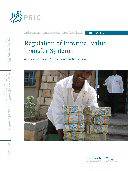The attention for informal remittance systems increased sharply after the 9/11 attacks in 2001. The lack of records and government control of these systems have raised concerns about the vulnerability with regard to terrorist financing, money-laundering and other financial crimes. Still, these informal mechanisms seem to persist as they offer advantages in terms of speed, price, accessibility and familiarity. National authorities differ significantly in how they address money remittance providers, in terms of the requirements they impose, how these are enforced and sanctioned, and in the range of complementary policies. This study compares the regulatory approach of five remittance-sending countries, namely the UK, Germany, the Netherlands, Sweden and Norway. It assesses the level of control the national authorities have, as well as how efficient the market functions for the consumers.
In doing that, the study tries to answer how the regulators can strike a balance between combating the abuse of informal remittance systems and safeguarding the legitimate uses of these systems. In addition to answering the question on an empirical basis, recent theory on informal economies is consulted. The EU Payment Services Directive, implemented in 2009/2010, introduced significant changes to the national regulatory frameworks, which are also discussed in this paper.








